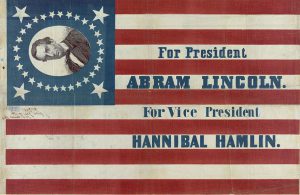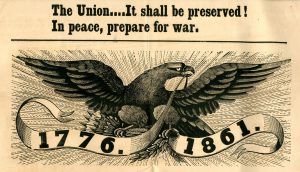It might seem odd, but the 1860 election – pitting Congressman Abraham Lincoln and Senator Hannibal Hamlin against Senator John Cabell Breckenridge and Senator Joseph Lane – did not particularly transfix the nation – at least if one goes by Regina Shober Gray’s[1] diary.
There was plenty of pageantry on offer: a “blazing mass of light on the Parade ground, vivid with every colour, marching & counter marching there as they fell into line [for the Lincoln–Hamlin torchlight parade through Boston], while along every mall & street came other long lines all converging there – the spirited music accompanying every company – the blaze of splendid rockets &c with their incessant changes of fitful, flickering glare, making the wildest, weirdest effects of light on overhanging trees & upturned faces & all the lurid canopy like smoke over a battlefield – made [a] scene of marvelous beauty.”[2]
Still, Mrs. Gray was more fascinated by the visit of the young Prince of Wales[3] in the days before the election: “The Prince passed up Bowdoin St. at 12½ o’clock to his reception by the governor, at the state house. The cortege (6 or 8 4-horse barouches) was preceded by 12 mounted policemen on white horses with blue saddle-cloths. At the State H. [the Prince was] received by a military escort and passed between double files up the front steps to the Hall. They drove so rapidly by here that by the time I brought my glass to bear the prince had passed, giving me a glimpse of his nose and his shoulders!!
“Our street & house[4] was crowded – our yard wall manned by the boys and their young friends, whom Fanny [Gray][5] charged to give him a good cheer. Frank [Gray][6] insisted it was more courteous to cheer him by the title he had chosen for himself in this country, ‘Lord Renfrew’[7] – accordingly when he led off with the voice of a young Stentor, ‘3 cheers for Lord Renfrew’ in which the boys all joined with a will, the Prince quite started to bow, and looked much amused!!” (18 October 1860)
In time, the Prince’s week-long visit ended and the national election became Mrs. Gray’s focus:
61 Bowdoin Street, Tuesday, 6 November 1860: A stormy morning for the presidential election, but it seems clearing away now at noon. A grand thing it is, when one realizes it – this universal ballotting over our whole wide land – which we hope will result in Lincoln’s election and the inauguration of a higher, truer policy in the political management of our country. A policy which shall do no injustice to the slave-holder,[8] yet shall say to slave-power “Thus far and no farther!”
Our neighbor “Thwing”[9] illuminated beautifully last night with flags and Chinese lanterns for the Bell-Everett[10] torch-light parade, which passed through Bowdoin st. Our boys got up a Lincoln torch-light for last evening – and made quite an appearance with 12 or 14 torches, and two flags – and Sam [Gray]’s[11] iron drum rattatoed briskly by Thorne Nourse.[12] They showed not a little taste and ingenuity in getting up, with Mary [Gray]’s[13] help, their torches & transparencies. But quiet folks like myself will rejoice when all the election fusses are over!
Sunday, 11 November 1860: …Political matters look stormy enough. Lincoln’s election for President, by a tremendous majority, irritates the South and they are making great bluster and many threats of secession &c. But I fancy it will all end in talk! Lincoln embodies the principle of resistance to the aggressions of the slave power, and extension of slavery, and in ‘so far, his election’ is a triumph of abstract right over established wrong – of absolute truth over political expediency and commercial conservatism. It is a splendid proof of the power of moral regeneration inherent in a free people.
Saturday, 17 November 1860: …The news from South Carolina and other Cotton states is quite stormy. Rabid demagogues talk fiercely of secession and resistance – Northern residents are being sent home. Strange madness of passion, prejudice, and political rancor! they do not seem to see how much better the north can do without them, than they without it. Already they are suffering financially from the effects of this false and untenable position in which they have placed themselves – and will suffer more. What northern State or faction would dream of dissolving the union, had Breckinridge, the slave candidate, been elected instead of Lincoln. All has been done in strict accordance with constitutional regulations. The majority have determined to arrest the further extension of slavery – they do not propose to interfere with it in the old States – that glorious reform must be made by themselves if made at all – as God in Heaven grant it may.
The year 1860 – the first of twenty-five years covered in the Gray diary – ended with these reflections:
Monday, 31 December 1860: …The old year which may be memorable to all future time, by the rupture of this glorious federal union – the failure and ruin of the most brilliant attempt at national self-government ever made by man. Pitiable it is, for human progress and Christian civilization, that in a world where despotism, oppression, and intolerance can hold a nation together as one indivisible body-politic through centuries of time – this glorious edifice of free government, founded on all the great ideas of civil and religious liberty, built up with the cement of “peace and good will to men,” enlightened in policy, active in practical usefulness, comprehensive in educational advantages, broad in its religious Catholicity, embellished by all that science, art, and intellectual cultivation can contribute to adorn and strengthen it – should yet fall asunder from its own weight, ere yet its first complete century has been welcomed by peal of rejoicing bells or deep-mouthed salute of bellowing cannon.
Alas! there is deep inherent weakness in the splendid pile, a treacherous flaw, feared by the far-seeing and right-thinking from its earliest time, and it has widened and bent beneath each new pressure, each added story, till now the whole seems tottering to its downfall. May God “our Father” who “ruleth all things well” yet make the “rough places plain, and the crooked paths straight” before our feet…
Notes
[1] Hedwiga Regina Shober (1818–1885) was married to Dr. Francis Henry Gray 1844–80. Entries from the Hedwiga Regina Shober Gray diary, R. Stanton Avery Special Collections.
[2] Entry for 17 October 1860.
[3] Albert Edward, Prince of Wales (1841–1910), who succeeded his mother as King Edward VII in 1901.
[4] At 61 Bowdoin Street, near the State House.
[5] Dr. Gray’s niece, Frances Loring Gray (1843–1919), who married William Adams Walker Stewart in 1874.
[6] The diarist’s eldest son, Francis Calley Gray (1846–1904).
[7] One of the Prince’s subsidiary titles.
[8] This appears to be the first direct reference to slavery in the diary.
[9] William Thwing (1800–1880) married Louisa Payne in 1830. The Thwings lived at 52 Bowdoin Street in 1860.
[10] Senator John Bell and Dr. Gray’s cousin the statesman Edward Everett, candidates of the Constitutional Union Party.
[11] The diarist’s second son, Samuel Shober Gray (1849–1926).
[12] Thorndike Nourse (1847–1904).
[13] Mrs. Gray’s daughter Mary Clay Gray (1848–1923).
Share this:
About Scott C. Steward
Scott C. Steward has been NEHGS’ Editor-in-Chief since 2013. He is the author, co-author, or editor of genealogies of the Ayer, Le Roy, Lowell, Saltonstall, Thorndike, and Winthrop families. His articles have appeared in The New England Historical and Genealogical Register, NEXUS, New England Ancestors, American Ancestors, and The Pennsylvania Genealogical Magazine, and he has written book reviews for the Register, The New York Genealogical and Biographical Record, and the National Genealogical Society Quarterly.View all posts by Scott C. Steward →

